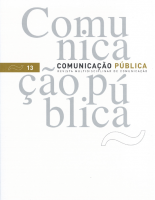From integration to legitimacy
values and publics in public relations
DOI:
https://doi.org/10.4000/cp.489Keywords:
public relations, legitimacy, integration, publics, political functionAbstract
This article explores the role of Public Relations as a political activity of the organisation, which assumes a strategical role in its legitimacy. That can’t be reduced to an auxiliary tool for other disciplines. Regarding the notion of legitimacy function, we propose a new tipology of publics, focused on the individual relation with what can be defined as the organisation center – the set of values that defines it. This framework wants to overcome some of the limitations of sociodemographic characterization of publics, presenting a new way of understand the organisation’s relationship with them.
Downloads
References
Arendt, H. (2001), A Condição Humana. Lisboa: Relógio D'´Água Editores.
Cutlip, S., Center, A., Broom, G. (1985), Effective Public Relations. 6.ª ed. Prentice-Hall. Nova Jérsia.
da Silva Jorge, N., Pimenta, L., Farinha, S. (2013), «Grassroots campaign in the USA. Would it be possible in Portugal?», Business Research Yearbook. The Importance of Research to the Global Community, vol. XX, International Academy of Business Disciplines.
Eiró-Gomes, M. (2006), Relações Públicas ou a Comunicação como Acção. Lição para o concurso para professora coordenadora, Escola Superior de Comunicação Social.
Gorjão, R. (2011), «A hipótese searliana de background e a sua pertinência para as Relações Públicas». Tese de mestrado, Escola Superior de Comunicação Social.
Gregory, Anne (2001), «Public relations and management», in Theaker, Alison (ed.), The Public Relations Handbook. 2.ª ed. Routledge. Londres. pp. 35-51.
Grunig, J. E., Hunt, T. (1984), Managing Public Relations. Lawrence Erlbaum Associates. Nova Jérsia.
Hagen, Ø. (2009), «Do socially responsible brands lead to socially responsible companies? Understanding change in expressive organisations». Tese de doutoramento, Faculty of Social Sciences and Technology Management of Norwegian University of Science and Technology.
Honneth, A. (2011), Luta pelo Reconhecimento. Para uma Gramática Moral dos Conflitos Sociais. Lisboa: Edições 70.
Kelsen, H. (2009), «O problema do parlamentarismo», in Aurélio, D. P. (ed.), Representação Política. Lisboa: Livros Horizonte, pp. 151-175.
Oliveira, C. (2012), «A Internet nas campanhas políticas eleitorais — o caso de Barack Obama nas presidenciais de 2008». Revista Comunicação Pública, n.º 01E, pp. 103-136. DOI : 10.4000/cp.251 good / bad
Phillips, D. (2009), «The value of relationships», Comunicação Pública, n.º 07 e 08, vol. 4, pp. 553-572.
Porto Simões, R. (1995), Relações Públicas: Função Política, 5.ª ed, São Paulo: Summus Editorial.
Rokeach, M. (1973), The Nature of Human Values. Nova Iorque, Free Press.
Sheldrake, P. (2011), Business of Influence: Reframing Marketing and PR for the Digital Age, John Wiley & Sons.
Shils, E. (1992), Centro e Periferia. 1.ª ed, Lisboa: Difel.
Weber, Max (1979), «A política como vocação», in O Político e o Cientista. Lisboa: Editorial Presença, pp. 47-139.
Downloads
Published
Issue
Section
License
Copyright (c) 2013 Direitos do Autor (c) 2013

This work is licensed under a Creative Commons Attribution-NonCommercial 4.0 International License.
Os conteúdos da Comunicação Pública estão licenciados com uma licença Creative Commons - Atribuição-NãoComercial 4.0 Internacional.


